-
 Univers
Univers
-
 Ebooks
Ebooks
-
 Livres audio
Livres audio
-
 Presse
Presse
-
 Podcasts
Podcasts
-
 BD
BD
-
 Documents
Documents
-
- Cours
- Révisions
- Ressources pédagogiques
- Sciences de l’éducation
- Manuels scolaires
- Langues
- Travaux de classe
- Annales de BEP
- Etudes supérieures
- Maternelle et primaire
- Fiches de lecture
- Orientation scolaire
- Méthodologie
- Corrigés de devoir
- Annales d’examens et concours
- Annales du bac
- Annales du brevet
- Rapports de stage
La lecture à portée de main
Vous pourrez modifier la taille du texte de cet ouvrage
Découvre YouScribe en t'inscrivant gratuitement
Je m'inscrisDécouvre YouScribe en t'inscrivant gratuitement
Je m'inscrisEn savoir plus
Vous pourrez modifier la taille du texte de cet ouvrage
En savoir plus

Description
Informations
| Publié par | Andrews UK |
| Date de parution | 26 août 2014 |
| Nombre de lectures | 0 |
| EAN13 | 9781845407810 |
| Langue | English |
Informations légales : prix de location à la page 0,3750€. Cette information est donnée uniquement à titre indicatif conformément à la législation en vigueur.
Extrait
Title page
Michael Oakeshott Selected Writings Collection
Publisher information
Notebooks, 1922-86
Copyright © 2014 Imprint Academic
Early Political Writings 1925-30
Copyright © 2010 Imprint Academic
The Concept of a Philosophical Jurisprudence
Copyright © 2007 Imprint Academic
The Vocabulary of a Modern European State
Copyright © 2008 Imprint Academic
Lectures in the History of Political Thought
Copyright © 2006 Imprint Academic
What Is History?
Copyright © 2004 Imprint Academic
The moral rights of the author have been asserted.
No part of any contribution may be reproduced in any form without permission, except for the quotation of brief passages in criticism and discussion.
Digital version converted and published in 2014 by
Andrews UK Limited
www.andrewsuk.com
Title page
Michael Oakeshott
Notebooks, 1922-86
Edited by Luke O’Sullivan
Preface
In the decade during which this series has been in preparation, Oakeshott’s reputation has continued to grow. The recent appearance of a volume devoted to him in the series of Cambridge Companions effectively acknowledges that he has achieved a canonical status accorded to relatively few writers. Only the most important modern philosophers merit inclusion in such a series, and when a writer is recognized to have achieved this kind of status, the presumption is that everything he had to say is of potential interest.
Many of the other authors of the same rank have had their unpublished as well as their published works exhaustively dissected. In particular, where they left collections of notebooks, these have eventually seen publication. This has certainly been the case for Nietzsche and Wittgenstein, for example, and few would argue that bringing their private reflections to light has been a wasted endeavour. Readers will hopefully come to think the same of the present volume, which includes selections from over forty of Oakeshott’s notebooks, spanning his entire career.
The notebooks open a window onto Oakeshott’s intellectual development that simply cannot be found elsewhere amongst his writings. They are a unique source of aphorisms and miniature essays that have no parallel in his books, articles, and reviews, although they certainly form a valuable complement to the published works. As the editorial introduction will show, they indicate connections between his private and scholarly life that have only recently begun to come to light, and make clear continuities in his thought, such as a persistent interest in Christianity, which are much less visible elsewhere.
The original intention was for this sixth volume in the Selected Writings series to be the final one. It was to have consisted in selections from both Oakeshott’s letters and his notebooks. But as work proceeded, it became clear that combining the notebooks with the letters in this fashion would have meant sacrificing too much interesting material. This conviction was only reinforced by the emergence of eleven new notebooks from the years 1928-34, which delayed completion of this volume by over a year while this new material was assimilated.
Imprint Academic thus graciously consented to a change of plan, and a separate seventh volume of correspondence will now hopefully follow in due course. Even this does not quite exhaust the material that deserves to be made more widely available, and so an eighth (and hopefully final) volume collecting up the more miscellaneous items amongst Oakeshott’s papers is also planned.
This is the second volume in the series to have been completed mainly at the Political Science Department of the National University of Singapore, and once again I am pleased to be able to acknowledge the financial help I received when making a trip to the London School of Economics in June and July 2012 to carry out archival work.
The generosity of Mr. Simon Oakeshott in making available his father’s private notebooks, and in granting his permission for early publication of excerpts from the writings they contain, deserves particular thanks. Professor Robert Grant was kind enough to share his digital photographs of both the new and existing notebooks which made preparing this edition at a distance feasible. I am also grateful to Mr. Chris Thomas of the Powys Society for his assistance with a query regarding the Cornhill Magazine . The continuing support of the Archive at the British Library of Political and Economic Science was essential for the volume to appear at all. As for the burden of transcribing the notebooks, it fell entirely on the editor, who as usual must be held solely accountable for all the mistakes that were made. Finally, profuse editorial thanks are owed to Mr. Graham Horswell for his patience in dealing with a particularly troublesome set of proofs.
Singapore, 2013
Introduction
Oakeshott attached considerable importance to his notebooks. He kept them all his life, and specifically mentioned them in his will as amongst the literary remains that his executor was to take charge of. [1] He also revealed their existence to those who knew him personally, and from time to time passing references to them would appear in print. [2] After his death they became part of the collection of his papers at the British Library of Political and Economic Science, but until now there has been no way to consult them without visiting the archive. Even those prepared to make the trip will not find them easily digestible in the form in which Oakeshott left them. In their unedited state they consist of several hundred thousand words and include material of all sorts, including quotations, transcriptions, reflections, and miniature essays. [3]
This volume contains selections from over forty of the notebooks. They begin in the early 1920s and break off around the mid-1980s. They fall into four more or less distinct groups. The first, largest, group is a series which Oakeshott kept throughout his career. The notebooks in this group are numbered one to twenty-one, indicating unmistakably that he regarded them as a single series. The second is a group of eleven notebooks containing reflections on love and women composed over a relatively short period, 1928 to 1934. Though unnumbered, their dating and subject matter means that they too must be regarded as a single set. The third group is devoted to a close analysis of some of the major works of Plato, Aristotle, and Spinoza, and dates mostly from an even shorter period, 1923-4. It derives its unity from the period and purpose of its composition. Finally, there are a couple of individual notebooks compiled around the end of the war in 1945. [4]
Oakeshott remarked in one of his very last notebooks that ‘This is a sort of Zibaldone : a written chaos.’ [5] Whether he meant the individual notebook or the whole series is unclear, but the comparison with Giacomo Leopardi, whose own notebooks were published as the Zibaldone di pensieri , is significant. In drawing it, Oakeshott was connecting himself to a European aphoristic tradition. That this was a well-meditated observation rather than a passing comment is suggested by the fact that his notebooks feature remarks by a whole host of contributors to the genre. The list includes Pascal, La Rochefoucauld, Vauvenargues, Charles Duclos, Georg Lichtenberg, Antoine de Rivarol, Richard Garnett, Charles Colton, Nietzsche, and F.H. Bradley, amongst others.
A successful aphorism, according to one of its modern students, should be brief, definitive, personal, and philosophical; and it should have a twist, a sting in the tail. [6] There are plenty of examples in these notebooks of aphorisms that Oakeshott seems to have coined himself which meet these criteria. For example, ‘Prejudice is knowing the answer to a question without knowing that it is an answer to a question’ [7] gives a pithy definition which invokes the philosophical proposition that all ideas involve assumptions, while also providing a sharp reminder of the limits of common sense. There are plenty of others - ‘Loneliness is not living alone; it is loving alone’, and ‘A book is a mirror; we see only ourselves’, are two more examples - which readers will discover for themselves. [8]
The notebooks are much more than a collection of aphorisms, however. A number of major twentieth-century philosophers routinely drew inspiration from poetry and the novel; George Santayana, Iris Murdoch, and Jean-Paul Sartre are notable examples. Though he would not have enjoyed the comparison with Sartre, Oakeshott, too, belongs to this group. A lifelong interest in literature informed his entire intellectual outlook. In general, the novelists Oakeshott favoured were themselves philosophically inclined, and in his notebooks he treated literary depictions of characters, ideas, and situations as either incipiently philosophical in themselves or as material for further philosophical reflection. Amongst his favourites were Spanish and Russian authors such as Cervantes, Turgenev, and Tolstoy, although he also had considerable affection for writers in English such as Henry James and Joseph Conrad. An idea encountered in a novel could assume lasting importance for him, as was the case with Conrad’s notion of the ‘shadow line’ that separates the illusions of youth from the realities of adulthood.
Oakeshott treated poetry in the same way, and was especially drawn to the Romantics. His early admiration for Wordsworth and Coleridge is familiar; they both appear, albeit briefly, in a consideration of the nature of ‘the State’ which concluded, in keeping with Idealist philosophy, that State, Self, and Society were ultimately all aspects of a single whole. So, indeed, does Shelley; Oakeshott wrote approvingly that he had grasped ‘the true

Ebooks
Concept of a Philosophical Jurisprudence
Michael Oakeshott

Ebooks
Philosophie
Concept of a Philosophical Jurisprudence
Michael Oakeshott
253 pages
English
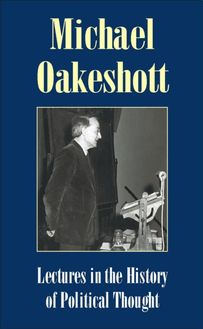
Ebooks
Lectures in the History of Political Thought
Michael Oakeshott

Ebooks
Philosophie
Lectures in the History of Political Thought
Michael Oakeshott
283 pages
English
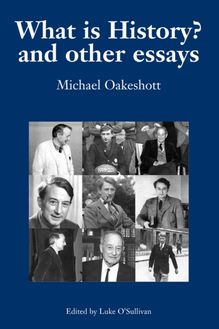
Ebooks
What Is History?
Michael Oakeshott

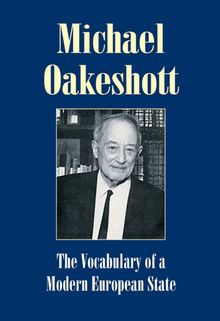
Ebooks
Vocabulary of a Modern European State
Michael Oakeshott

Ebooks
Philosophie
Vocabulary of a Modern European State
Michael Oakeshott
207 pages
English
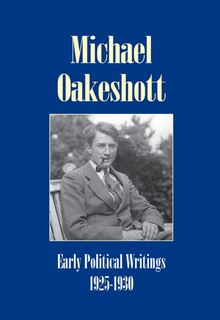
Ebooks
Early Political Writings 1925-30
Michael Oakeshott


Ebooks
Michael Oakeshott
Michael Oakeshott

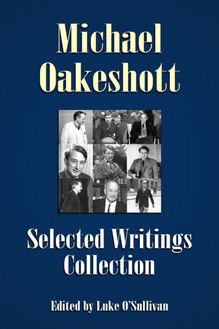
Ebooks
Michael Oakeshott Selected Writings Collection
Michael Oakeshott

Ebooks
Politique
Michael Oakeshott Selected Writings Collection
Michael Oakeshott
1831 pages
English
-
 Univers
Univers
-
 Ebooks
Ebooks
-
 Livres audio
Livres audio
-
 Presse
Presse
-
 Podcasts
Podcasts
-
 BD
BD
-
 Documents
Documents
-
Jeunesse
-
Littérature
-
Ressources professionnelles
-
Santé et bien-être
-
Savoirs
-
Education
-
Loisirs et hobbies
-
Art, musique et cinéma
-
Actualité et débat de société
-
Jeunesse
-
Littérature
-
Ressources professionnelles
-
Santé et bien-être
-
Savoirs
-
Education
-
Loisirs et hobbies
-
Art, musique et cinéma
-
Actualité et débat de société
-
Actualités
-
Lifestyle
-
Presse jeunesse
-
Presse professionnelle
-
Pratique
-
Presse sportive
-
Presse internationale
-
Culture & Médias
-
Action et Aventures
-
Science-fiction et Fantasy
-
Société
-
Jeunesse
-
Littérature
-
Ressources professionnelles
-
Santé et bien-être
-
Savoirs
-
Education
-
Loisirs et hobbies
-
Art, musique et cinéma
-
Actualité et débat de société
- Cours
- Révisions
- Ressources pédagogiques
- Sciences de l’éducation
- Manuels scolaires
- Langues
- Travaux de classe
- Annales de BEP
- Etudes supérieures
- Maternelle et primaire
- Fiches de lecture
- Orientation scolaire
- Méthodologie
- Corrigés de devoir
- Annales d’examens et concours
- Annales du bac
- Annales du brevet
- Rapports de stage





